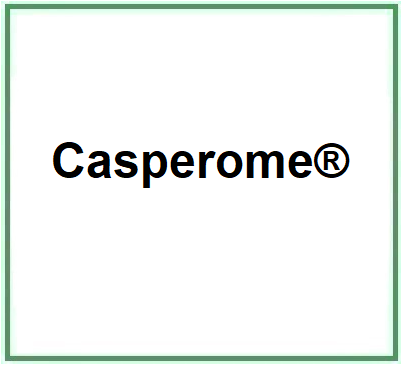Compendium of the most significant studies with reference to properties, intake, effects.
Loeser K, Seemann S, König S, Lenhardt I, Abdel-Tawab M, Koeberle A, Werz O, Lupp A. Protective Effect of Casperome®, an Orally Bioavailable Frankincense Extract, on Lipopolysaccharide- Induced Systemic Inflammation in Mice. Front Pharmacol. 2018 Apr 20;9:387. doi: 10.3389/fphar.2018.00387.
Abstract. Introduction: Despite recent advances in critical care, sepsis remains a crucial cause of morbidity and mortality in intensive care units. Therefore, the identification of new therapeutic strategies is of great importance. Since ancient times, frankincense is used in traditional medicine for the treatment of chronic inflammatory disorders such as rheumatoid arthritis. Thus, the present study intends to evaluate if Casperome® (Casp), an orally bioavailable soy lecithin-based formulation of standardized frankincense extract, is able to ameliorate systemic effects and organ damages induced by severe systemic inflammation using a murine model of sepsis, i.e., intraperitoneal administration of lipopolysaccharides (LPS). Methods: Male 60-day-old mice were assigned to six treatment groups: (1) control, (2) LPS, (3) soy lecithin (blank lecithin without frankincense extract), (4) Casp, (5) soy lecithin plus LPS, or (6) Casp plus LPS. Soy lecithin and Casp were given 3 h prior to LPS treatment; 24 h after LPS administration, animals were sacrificed and health status and serum cytokine levels were evaluated. Additionally, parameters representing liver damage or liver function and indicating oxidative stress in different organs were determined. Furthermore, markers for apoptosis and immune cell redistribution were assessed by immunohistochemistry in liver and spleen. Results: LPS treatment caused a decrease in body temperature, blood glucose levels, liver glycogen content, and biotransformation capacity along with an increase in serum cytokine levels and oxidative stress in various organs. Additionally, apoptotic processes were increased in spleen besides a pronounced immune cell infiltration in both liver and spleen. Pretreatment with Casp significantly improved health status, blood glucose values, and body temperature of the animals, while serum levels of pro-inflammatory cytokines and oxidative stress in all organs tested were significantly diminished. Finally, apoptotic processes in spleen, liver glycogen loss, and immune cell infiltration in liver and spleen were distinctly reduced. Casp also appears to induce various cytochromeP450 isoforms, thus causing re-establishment of liver biotransformation capacity in LPS-treated mice. Conclusion: Casp displayed anti-inflammatory, anti-oxidative, and hepatoprotective effects. Thus, orally bioavailable frankincense extracts may serve as a new supportive treatment option in acute systemic inflammation and accompanied liver dysfunction.
Riva A, Allegrini P, Franceschi F, Togni S, Giacomelli L, Eggenhoffner R. A novel boswellic acids delivery form (Casperome®) in the management of musculoskeletal disorders: a review. Eur Rev Med Pharmacol Sci. 2017 Nov;21(22):5258-5263. doi: 10.26355/eurrev_201711_13849.
Abstract. Standard pharmacological treatment of musculoskeletal conditions is often associated with relevant side effects. Botanical preparations endowed with a good tolerability profile, therefore, could have a role in the management of these disorders. Among different natural products, Boswellia serrata extracts have long been used for the treatment of musculoskeletal disorders, given their marked anti-inflammatory activity and their ability to promote tissue regeneration. However, standard preparations of Boswellia serrata show overall modest pharmacokinetic properties, a limitation which may ultimately lead to reduced efficacy. In an effort to improve the pharmacokinetic properties, Casperome®, a lecithin-based formulation of Boswellia serrata extract representing the whole natural bouquet, has been developed. This formulation was effective in the treatment of Achilles tendonitis, epicondylitis, radiculopathies, ankle sprains and sport injuries as shown in several clinical studies, the majority of which with a randomized design and all evaluating a number of well-recognized parameters of efficacy for the therapy of musculoskeletal disorder. All studies were consistent in showing a prompt decrease of pain and improvement of functionality of the affected area after supplementation with Casperome®, without any relevant adverse effect. Remarkably, these symptomatic improvements were paralleled by reduced plasmatic levels of inflammatory markers and by a diminished need for rescue analgesics. On these bases, Casperome® may have a role in the treatment of musculoskeletal disorders. Clinical studies in other similar conditions (e.g., osteoarthritis) appear warranted to further investigate the efficacy of this botanical product in more specific settings
Franceschi F, Togni S, Belcaro G, Dugall M, Luzzi R, Ledda A, Pellegrini L, Eggenhoffner R, Giacomelli L. A novel lecithin based delivery form of Boswellic acids (Casperome®) for the management of osteo-muscular pain: a registry study in young rugby players. Eur Rev Med Pharmacol Sci. 2016 Oct;20(19):4156-4161.
Abstract. Objective: Several experimental studies and clinical trials support the potential of Boswellia serrata extracts (BSE) for the treatment of various inflammatory diseases. The aim of this registry study was to assess the safety and the efficacy of a novel lecithin-based delivery form of Boswellia serrata extract (Casperome®) in the supportive management of osteo-muscular pain.....Conclusions: Our registry study suggests that Casperome® supplementation could represent an effective and safe, integrated approach for the treatment of osteo-muscular pain and inflammation.
![]() Casperome®
Casperome® 

